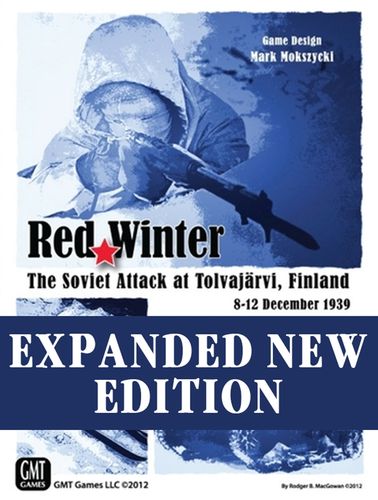|
Advertisement
|
Red Winter: The Soviet Attack at Tolvajärvi, Finland (Second Edition)

DescriptionRed Winter: Expanded 2nd Edition This 2nd edition game is more than just a reprint of the 2012 CSR Award winner for best WW2 boardgame. It features an all-new battle, complete with its own map and countersheet. The Battle of Kelja (December 25-27, 1939) now compliments the original Tolvajärvi battle. Kelja presents a challenge that is unique to the game system but certainly not the Winter War: a large-scale river crossing. The length of the new map is bisected by a wide, frozen river that functions as a frozen lake. Kelja is a logical fit for the game system in terms of length and scale. At three days, it provides a shorter play experience than the five-day Tolvajärvi battle. The unit density is only moderately higher than that of the previous battle but still limited to a single countersheet, and the featured river crossing offers a unique game situation, providing both players with plenty of decisions and challenges. Lest the battle become a “one trick pony,” plenty of options are available to both players, including variable unit setups, multiple victory conditions, variable reinforcement units, and smaller scenarios including some hypothetical situations. Mechanics Central to play is the Action Phase, wherein each unit may choose only one from several possible actions: move/assault, attempt recovery, dig in, or take replacement steps. This makes for some very tense decisions for both players. It also conveniently moves the game along at a brisk pace. Combat is fast and well integrated. Units may voluntarily perform combats against adjacent enemies (two-way firefights, which utilize a CRT), conduct assaults as part of movement, or make ranged attacks at a distance of two or more hexes. The “grand tactical” scale of 425 yards per hex yields ranges of 2 hexes for light machineguns, 3 hexes for heavy machineguns and T-26 tanks, 6 hexes for medium mortars, and 12 hexes for heavy mortars. Artillery is somewhat abstracted, being handled as off-map batteries which can strike any hex on the map. Players allocate barrages as they see fit, while keeping an eye on their ammunition. The rules for night turns provide several layers of strategic depth by means of individually simple mechanics. During each night turn, which simulates a 12 hour period, units have double their normal movement allowances. This means combat units can exploit gaps in the enemy’s frontline, cross lakes, or execute wide flanking maneuvers. However, such ambitious units are susceptible to “Sub-Zero” step losses, simulating frostbite, desertion, and poor morale from the extreme weather conditions. Whether or not each stack (note: stack, not individual unit) receives a step loss is determined by a simple 50-50 die roll. The interaction of these night rules means that ambitious players may be encouraged to push their luck and gain the upper hand during night turns, all while the system simultaneously encourages players to “do nothing” and even huddle their units together into stacks during night turns to reduce total step losses. The end result is that the system nicely mirrors the night actions of the actual battle. The implications of the night rules don’t stop there. Skilled players will plan ahead for a night turn by positioning their units favorably during the preceding dusk turn, so they won’t need to relocate and possibly take step losses. This nuance can (and should be) exploited by the Finns, who move second in the turn sequence. The Soviet player has the option to build bonfires to avoid sub-zero attrition losses, but in doing so his units become very inviting targets for Finnish assaults. All this gives both players a lot of choices, without burdening them with cumbersome rules or tables. —description from the publisher Game DiscussionsAdd CommentYou need to be logged in to comment. Insert Bullet List Please enter at least one item. Item: Item: Item: Item: Item: Insert Numeric List Please enter at least one item. Item: Item: Item: Item: Item: Insert Link Please enter the link of the website Optionally you can add display text Insert Email Please enter the email address Optionally add any display text Insert Image Please enter the link of the image Insert YouTube Video Please enter the link of the video Marketplace | ||||

Comments (0)